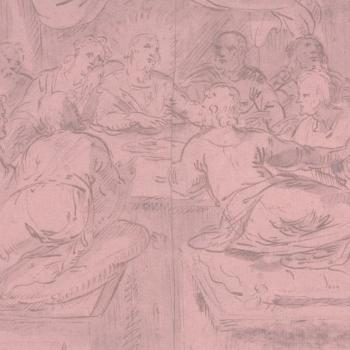
While many of us find ourselves progressive, forward leaning, and liberal (for lack of a better term) on issues of sex and sexuality, we still operate out of a Christian framework and a New Testament narrative lens. This means we still need to do our due diligence in engaging the Bible and faith on matters of ethics and values. However, as we engage these things there must be better and more important questions to ask then the one we unfortunately hear so often in purity culture, ‘can Christians have premarital sex?’
Growing up in purity culture as a young girl that went from Roman Catholic to Charismatic Evangelical, I never had a chance to think for myself and toil through the complex, unique, and beautiful layers of human sex and sexuality. I was too busy occupying spaces where the question “can Christians have premarital sex” ruled the day with the closed and dead end answer of “No.”
Phrases like, ‘true love waits’ and ‘guard your heart’ circulated widely as reminders of what ‘God’ wanted from us. Sex was wonderful and beautiful, but only in marriage. Anything else would render you damaged goods, and while restoration was possible it still would be a plan B situation.
Girls were often admonished for looking sexier than they were supposed to, with thin shirt straps and shorter skirts. The boys were told to abstain from masturbation, as if only those who possessed a penis would have the type of carnal desires that would lead to self-pleasuring.
Porn was the evilest activity, establishing a life killing addiction at first watch.
Of course, all of this was in the context of heterosexuality. The concept that sexuality was a spectrum, gender could be fluid, gay sex could be holy, and that there was more to sex and sexuality then just a man and a woman and a marriage bed, was completely out of the scope of Evangelical imagination.
At 24 I had made it to marriage, that would end up in divorce several years later, as a virgin. At the time, I was slowly moving out of Evangelical culture and belief systems. It was the start of a long period of deconstruction (as the kids call it these days). I made it to marriage as a virgin not because I still held any conviction about sex in or outside of marriage, but because I had waited this long already, and I didn’t really have any sexual ethic of my own.
At 31 I was divorced. I wasn’t thinking about marriage or anything having to do with another relationship. I just wanted to be on my own, do my thing, and try to heal.
However, I did have the question that lurked, ‘what about sex?’ And more than that, what about relationships? What does it look like to be in love without marriage as the end goal, how do I relate to my own sexuality, and what do I think about it all? Essentially, what is the sexual ethic I will now approach my life and sexuality with?
Evangelicalism is never a safe space for these kinds of questions. Especially not for women. At the time, I was still figuring all this out the hard way. I tried to reach out and was met with answers like, ‘well you know what the Bible says about sex and marriage’ and ‘sex can be the most beautiful inside of marriage.’
That was the end of those conversations.
I am a thoughtful person, in terms of I like to know what and why I think about things. I knew I was going to have to go on a journey toward a new sexual ethic. One that made sense, was meaningful, didn’t ask me to compromise being true to myself and the integrity of my journey, and one that somehow accounted for a faith I still seemed to profess, albeit a far cry from the faith I once held.
I started to study. I read the philosophers, the theologians, the sociologists, and the anthropologists. I engaged learning and research on ethical porn and feminists’ perspectives on honorable sex work. I wanted everything I didn’t know and was never told. I wanted to see the other side of it all. And, of course, as someone who is deeply passionate and committed to hermeneutics and interpretation, I also wanted to approach the Bible and engage all those harmful texts that did so much damage and are still wreaking havoc in purity culture today.
“Do not stir or awaken love before its time” -Solomon 8:4
“It is better to marry than burn with passion” -1 Corinthians 7:9
Verses like these are touchstones of purity culture and can choke out desire with fear. No story, no context, no entering into the complexities and nuance of social location, just a convenient proof text with no opportunity to engage the text well, critically, and with the respect it deserves.
A few years ago, a fabulous book came out by sexual ethicist, Victoria Brooks, entitled Fucking Law: The Search for Her Sexual Ethics. Here Brooks tries to fill the gap, hence the word search, as she explores the origin of sexual ethics, its trajectory, and why it all needs to change.
Her first two chapters are entitled, “Fucking Philosophy” and “Fucking Ethics.” This fucking, for Brooks, is twofold. In one sense, she writes in support of the claim that philosophy and ethics have been approached cerebrally and academically with the bias of those who are forming them. For this reason, they need to be completely decimated; blown to pieces and totally and completely fucked. In the other sense, philosophy and ethics surrounding sexual ethics simply need a good fucking. Because how can one think through ethical decisions about fucking without actually doing so? This is an ethic that needs embodiment. It requires a body, not just a mind.
Her book is fascinating and freeing on so many levels, filled with questions that challenge our conventional means to knowledge and ethic development. Means in which embodiment and experience pave the way toward discovery.
In her final chapter, “Fucking Kindness,” Brooks challenges with the question, “Will you be kind?” She writes, “Kindness can bring a body to life and sit it strong and able to withstand the harshest of judgments from law, from other, from oneself.”[1]
Kindness, fucking kindness, is what purity culture is missing. There is zero kindness and regard for our desires, our humanity, our lives, our processes, and so many other categories that have suffered from the flat, boring, useless, wrong, and ridiculous question, ‘can Christians have premarital sex?’
If we don’t approach these questions and ethical queries with kindness, mutuality, respect, and hospitality, then what is the point?
Brooks says, “Think carefully about what the kind thing to do is, to you and to other bodies (whatever kind of body they may be, whatever its history, analysis and its species), think carefully outside of philosophy (these are judgments underpinned by someone else’s orgasms; why would it be helpful to you?), think carefully without your head, and in tune with your body.”[2]
Purity culture ethics are being decided and propagated by someone else’s thoughts and experiences, their misconstrued hermeneutic, and mishandling of Biblical texts in super dangerous ways.
Finally, she urges, “Think with your fucking body, when and where it comes, and what this says about what and who you need in your life. Whatever you do, whoever you do it, or where, be kind.”[3]
Kindness protects, cares for, looks after, and checks in. Purity cults accosts and assaults our desires, abusing them, calling them dirty and unholy.
Purity culture needs to be fucked. It needs to be utterly destroyed and, perhaps, it just needs a really good fucking.
Brooks admits that this is about a journey and a search. She doesn’t have it all figured out. Neither do I. But it is about new ethical questions to be asked at every turn. Our life and our sexuality are dynamic. Our ethics are ever being developed as we continue to traverse.
In Body, Sex, and Pleasure: Reconstructing Christian Sexual Ethics , Christine E. Gudorf says that talking about sexual ethics in terms of being sinful has failed to reflect on the need for sex and what it might mean for us. She says that we must call for an acts-centered ethic. In other words, the relationship in which the act occurs is what can determine the morality of the act. The mutuality and community piece are front and center, and shame is a non-starter. She calls purity culture “sexual moral minimalism.”[4] By which she means, there is simply nowhere to go from there, no opportunity for growth.
Back to the unhelpful question, ‘can Christians have premarital sex?’
We can talk about sexual ethics from a humanist and non-faith perspective all day. But you are reading this on the Progressive Christian channel of Patheos, which means we value what a Christian sexual ethic might look like. Does a healthy Christian sexual ethic exist and how do we figure it out? Where do we go from here? If we are claiming to work out of a New Testament narratival worldview, then we must engage the text in ways that matter.
While I don’t have a semester’s worth of time to explore the topic of sexual ethics and the Bible here, I would like to say a word about the Corinthian text quoted earlier. This is a small example to provoke all of our appetites for a more expansive imagination and study when it comes to what Scripture has to say, or not say(!) in some of these matters that we have given it the gavel in for a very long time, and to our detriment.
When we look at Paul, we have to take into consideration his social context and location. Now it would be very easy in all matters of complexity to shoo it away with ‘oh, but context.’ That is not what I am doing. I am simply saying we need to take a closer look because there is always more than meets the eye.
For example, Paul in this passage is rejecting desire. He does this to fly in the face of contemporary culture and other philosophies and religious practices of the day. There was a belief that marriage killed desire. Therefore, squelching desire and burning passion happened by being married. So, when Paul writes, it is better to marry than to burn with passion, and we know it is heavy with first century culture and context, we tread lightly as we continue to delve into all the beautiful, historical, and social nuances we will undoubtedly continue to uncover. The thing we don’t do is build 21st century sexual morality and ethics on it. That is an inappropriate response to the text, and it is disrespectful to handle it as such. Yet it is exactly what purity culture has done.
So, can Christians have premarital sex? I think you’ll find this is a moot question, and one that doesn’t make sense to ask.
Should we approach a faithful sexual ethic with thoughtfulness, kindness, and hospitality when it comes to ourselves and others? The answer to this question is yes.
To close, a word from Jamieson Webster from her latest book, Disorganisation and Sex.
“Sex has the power to bring something revelatory, a satisfaction that we name sexual which changes something in reality. At my most open I want to be on this adventure.”[5]
Sex is a dynamic human act that opens us up to ourselves in ways that are transformative, invitational, and incarnational, as we become ever more fully ourselves, responding faithfully and in kindness at each turn. Developing a sexual ethic in dialog with values of faith, we will be asking new questions of the future, ourselves, our faith and, of course, our fucking.
[1] Victoria Brooks, Fucking Law: The Search for Her Sexual Ethics. (Winchester: Zero Books, 2019), 108.
[2] Ibid, 114.
[3] Ibid.
[4] Christine E. Gudorf, Body, Sex, and Pleasure: Reconstructing Christian Sexual Ethics. (Cleveland: The Pilgrim Press, 1994), 15.
[5] Jamieson Webster, Disorganisation and Sex. (Brussels: Divided Publishing, 2022), preface.













